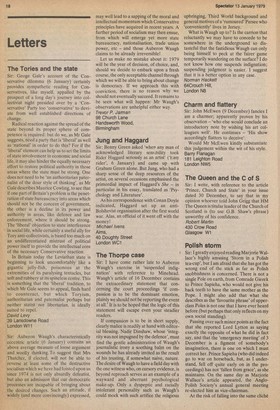The Tories and the state
Sir: Geoge Gale's account of the Conservative dilemma (6 January) certainly provides sympathetic reading for Conservatives, like myself, appalled by the prospect of a long day's journey into collectivist night presided over by a 'Conservative' Party too 'conservative' to deviate from well established directions of change.
Radical reaction against the spread of the state beyond its proper sphere of competence is required: but do we, as Mr Gale suggests, need a party that is 'liberal' as well as 'national' in order to do this? For if the 'liberal' element can help us to set the limits of state involvement in economic and social life, it may also hinder the equally necessary effort to restore political authority in those areas where the state must be strong. One does not need to be 'an authoritarian paternalist of the dour style of thinking', as Mr Gale describes Maurice Cowling, to see that if one part of Britain's problem is the penetration of state bureaucracy into areas which should not be the concern of government, the other is a decline in its power and authority in areas, like defence and law enforcement, where it should be strong. The 'liberal' objection to state interference in social life, while certainly a useful ally for Tory anti-collectivists, is based too much on an undifferentiated mistrust of political power itself to provide the intellectual core of the necessary Conservative reaction.
In Britain today the Leviathan state is beginning to look uncomfortably like a gigantic jelly-fish, poisonous at the extremities of its paralysing tentacles, but soft and rubbery at its spineless centre. This is something that the 'liberal' tradition, to which Mr Gale seems to appeal, finds hard to counteract, but which Toryism, authoritarian and paternalist perhaps but neither statist nor libertarian, is ideally suited to repel.
David Levy 39 Lansdowne Road London W11 Sir: Auberon Waugh's characteristically eccentric article (6 January) contains an above average measure of loose argument and woolly thinking. To suggest that Mrs Thatcher, if elected, will not be able to reverse at least some of the destructive socialism which we have had foisted upon us since 1974 is not only absurdly defeatist, but also an admission that our democratic processes are incapable of bringing about the desired changes. Such an attitude, if widely (and more convincingly) expressed, may well lead to a sapping of the moral and intellectual momentum which Conservative principles have acquired in recent years. A further period of socialism may then ensue, from which will emerge yet more state bureaucracy, nationalisation, trade union power, etc — and those Auberon Waugh claims to be already irreversible!
Let us make no mistake about it: 1979 will be the year of decision, of choice, and, should we decide to embark upon a fresh course, the only acceptable channel through which we will be able to bring about change is democracy. If we approach this with conviction, there is no reason why we should not eventually succeed. It remains to be seen what will happen: Mr Waugh's observations are unhelpful either way. Trevor P. Jarman 98 Church Lane Handsworth Wood, Birmingham


































 Previous page
Previous page